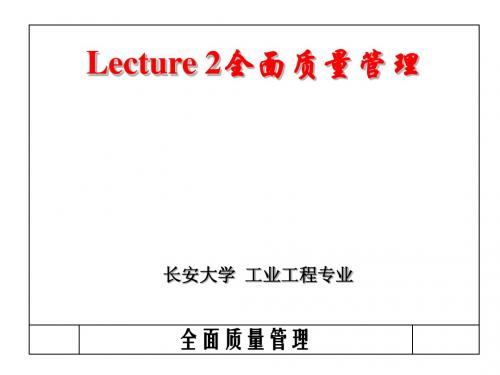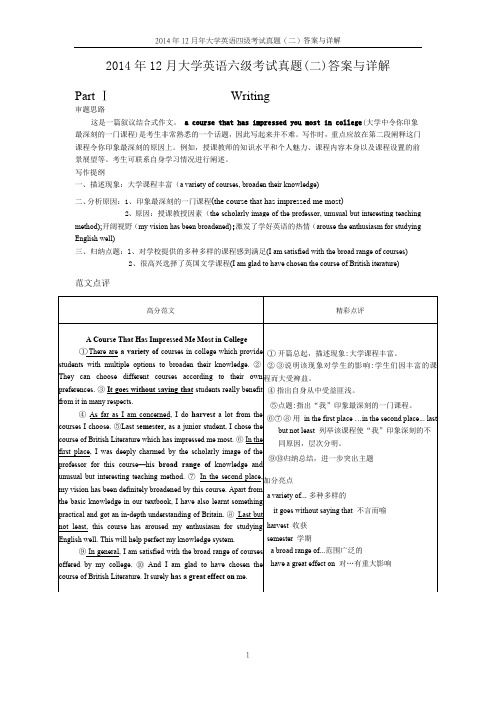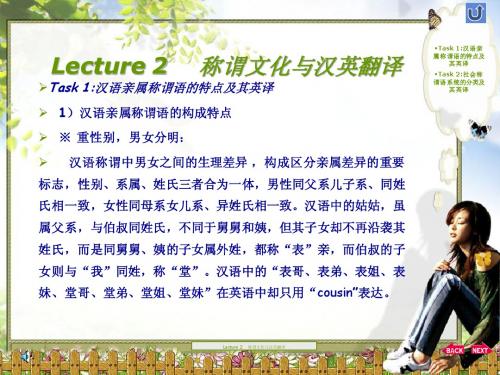2014 Lecture 2
Lecture2英语专业教学课件

➢ “Father of American Poetry” ➢ “Pioneer of the New
Romanticism” ➢ “A gifted and versatile lyric
poet”
1. Works
《美洲光辉的兴起》
• “The Rising Glory of America” (1772) • “The House of Night” (1779, 1786) • “The British Prison Ship” (1781) • “To the Memory of the Brave Americans” (1781) • “The Wild Honey Suckle” (1786) • “The Indian Burying Ground” (1788) • “The Dying Indian: Tomo Chequi”
• Philip Freneau: “The Wild Honey Suckle”
1. Benjamin Franklin (1706-1790)
1. Works
《自传》
• The Autobiography • Poor Richard’s Almanack
《格言历书》
2. Life
Benjamin Franklin came from a Calvinist background. He was born into a poor candle-maker’s family. He had very little education. He learned in school only for two years, but he was a voracious reader. At 12, he was apprenticed to his elder half-brother, a printer. At 16, he began to publish essays under the pseudonym “Silence Do good” . At 17, he ran away to Philadelphia to make his own fortune. He set himself up as an independent printer and publisher. In 1727 he founded the Junto club.
Lecture 2 全面质量管理

质量检验、 质量检验、统计质量控制与全面质量管理的特点对比
全面质量管理的工作程序
全面质量管理采用一套科学的、合乎认识论的办事程序, 也即是P、D、C、A循环法。PDCA由英文的计划(P1an)、 执行(Do)、检查(Check)、处理(Action)几个词的第一个 字母组成,它反映了质量管理必须遵循的4个阶段。
质量螺旋quality 质量螺旋quality
13个环节(质量职能) 13个环节(质量职能) 个环节
朱兰质量螺旋曲线
1.质量形成过程 1.质量形成过程 :
质量环
质量形成过程的另一种表达方式是“质量环”。这种质量 循环 不是简单的重复循环,它与质量螺旋有相同意义。
对质量有影响的主要活动
朱兰质量螺旋的内涵相当丰富,就其实质而言,产品质量的 全过程管理可以概括为三个管理环节,即: 质量计划; 质量控制; 质量改进; 这三个环节用来反映产品质量形成的客观规律和指导质 量管理全过程的实施,简洁明白,且重点突出。通常称 之为“朱兰三部曲”。
戴明14条 戴明14条(1) 14
戴明14 戴明14条:2 14条
2、采用新观念; Learn the new philosophy 采用新观念并采纳适于持续改进的计划。充分认识我们处在 一个全球竞争的新时代,顾客不再容忍不良质量。企业业主必 须认识到他们不能回避质量运动。他们应当树立管理新观念, 引导员工加入到持续改进产品和服务的无限循环中来,同时,员 工以其工作质量为骄傲。忽视质量企业将面临极大的风险。
全面质量管理
全面质量管理的特点 :三全一多样
①全面的质量管理。 ②全过程的质量管理。 ③全员参加的质量管理。 ④全面质量管理采用的方法是科学的、多种多样的。
全面质量管理
Lecture 2 EnglishVarieties(2)

11
2.2.2 Regional Dialect
• Language varies from region to region. Owing to the physical boundaries of oceans and mountains, people who live in different places tend to develop different speech patterns. As far as the English language is concerned, there are British English, American English, Australian English, South African English, etc.
4
2.1. Classification of Language Varieties
• 1. DIALECTICAL VARIETIES, or DIALECTs, are language varieties that are associated with different users of the language. A dialect is a variety habitually adopted by people in a certain region (regional dialect) or by people of a certain social group(social dialect) or of a certain historical period (temporal dialect) .
5
• Due to the differences in users, this group can be further classified as: • --- temporal varieties • --- regional varieties • --- social varieties • --- standard varieties
lecture 2佛经翻译理论上

三 说明我国译论从开始就植根 于传统文化的土壤中
早期译经特点
• 一 “以口授相付,不听载文”
• 二 “译场”
• 三 “梵客华僧,听言揣意,方 圆共凿,金石难和,咫尺千里, 觌dí面难通”
• 四 “此土众经,出不一时…值 残出残,遇全出全,非是一人, 卒难宗理”
• 五 “审得本旨,了不加 饰”“弃文从质” “朴则近本”
自偈jì受译人口,因循本旨,不加文饰。
译所不解,则阙不传,故有脱失,多不 出者。然此虽词朴而旨深,文约而义博。 (《法句经序》)
之谦的翻译风格
• “谦辞旨文雅,曲得圣意”
• “谦以季世尚文,时好简略。 故其出经,颇从文丽”
《法句经序》在中国译论史上的意义
• 一 首次提出译事之不易
“名物不同,传实不易”
道安生平简介
• 东晋高僧、般若六家七宗之一 “本无宗”的代表。(314- 385)道安俗姓卫,常山扶柳 人。(今河北冀县)
• 钱钟书:“吾国翻译术开宗明 义,首推此篇。”
《摩诃钵罗若波罗蜜经抄序》
• “译胡为秦,有五失本也:一者胡 语尽倒,而使从秦,一失本也;二 者胡经尚质,秦人好文,传可众心, 非文不合,斯二失本也;三者胡经 委悉,至于叹詠,叮咛反复,或三 或四,不嫌其烦。而今裁斥,三失 本也;四者胡有义说,正似乱辞, 寻说向语,文无以异。或千五百, 刈而不存,四失本也;五者事已全 成,将更傍及,及腾前辞,已乃后 说,而悉除此,五失本也。”
道安翻译理论之不足
• 一 “故知 ‘本’ 有非‘失’ 不可者,此‘本’ 不‘失’, 便不成翻译。……安言之以为 ‘失’者而自行之则不得不然, 盖失于彼乃所以得于此也,安 未克圆览而疏通其理矣。” -钱钟书
英国文学Lecture 2 (乔叟)

5) In 1359-1360, went to France with Edward III's army during the Hundred Years' War (13371453). 6) Got married in 1366 7) Went abroad several times for diplomatic and commercial missions. 8) especially in Italy, he met Boccaccio and Petrarch in 137273, much influenced by the Italian humanists, such as Dante.
When in April the sweet showers fall And pierce the drought of March to the root and all The vein are bathed in liquor of such power As brings about the engendering of the flower; When also Zephyrus with his sweet breath, Exhales an air in every grove and heath, Upon the tender shoots, and the young sun His half-course in the sign of the Ram has run, And the small fowl are making melody That sleep away the night with open eye (So Nature pricks them and their heart engages) Then people long to go on pilgrimage (modern translation)
2014年全国卷2英语试题答案及详细解析

2014年普通高等学校招生全国统一考试新课标II卷英语参考答案第一部分1—5 BCDCC 6—10 ADADD 11—15 ADBBA 16—20 BGCAF第三部分21—25 CADBD 26—30 CDADB 31—35 ACBAC 36—40 BDACB41.being 42. and 43. disappointed 44. to 45. caught46. to stop 47. riding 48.Did 49. me/mine 50. suddenly第四部分My dream school starts at 8:30 a.m. and ends at 3:30 p.m. They are three lessonTherein the morning and two in the afternoon. We didn’t need to do so many homework.don’t muchTherefore , we have more time with after-school activities. For example, we can do readingforfor one and a half hour and play sport for one hour every day.hoursMy dream school look like a big garden. There are all kinds of the flowerslooksand trees around the classroom, buildings. We can lie on the grass for a rest, sat by thesit lake listenin g∧music. The teachers here are kind and helpfully. They are not only ourto helpfulteachers but also our friends.书面表达One Possible VersionI often imagine what my life will be like in the future. I think my life will be very different in ten years. I will be twenty-eight years old by then. I will have my own family. Probably with a lovely child. I hope I will work in a computer company as a program designer. I will enjoy my work and get along well with my colleagues, I will do a good job in whatever I do. In my free/spare time, I will continue to take regular exercise, such as swimming, running and various ball games. On my holidays, I will travel around the world. In a word, my life will be much richer and more colorful.2014年普通高等学校招生全国统一考试新课标II卷解析➢阅读理解A篇genre美[ˈʒɑnrə]体裁 a story about kindness of people in Sydney 体现人性的真、善、美B篇topic:environmental protection(环保)C篇hot topic(热门话题): Chinese Fever(汉语热)au pair [,əu'pεə][法语][英国英语](尤指外地来的)以帮做家务换取食宿的年轻女佣工;“互裨[bì]”姑娘(以授课、协助家务等只换取膳宿、学习英语、不取报酬的外国女子)D篇地铁小手册/指南考查学生快速查找提取有用信息的能力➢信息匹配题关于在繁忙中如何烹饪的小建议,难度适宜。
Lecture2

=have an effect on... =have an influence on...
e.g. Forgiveness and encouragement can make a great difference to a
child's future.
□ embarrassed embarrassing
□ forgive
v.原谅
e.g. We are always told to forgive and forget, for there is a saying “to err is
human, to forgive divine”.
□ make a difference to...
对......产生影响
Useful Words
□ forgiveness
n.宽恕;饶恕
ask forபைடு நூலகம்beg for forgiveness 请求/乞求原谅
e.g. The little boy begged me for forgiveness when he learned what he did
hurt me badly.
a.感到尴尬的 a.令人尴尬的
e.g. I felt very embarrassed when I found my students making fun of me,
for this was very embarrassing.
□ keep/stay calm 保持冷静; calm/cool down 冷静下来
所有(三者以上) 任何一个(三者以上) 没有一个(三者以上)
e.g. All of the apples are small. You can take any of them. None of them is ripe.
2014全国卷2英语作文

2014全国卷2英语作文Possible essay:The Importance of Learning from History。
In a rapidly changing world, it is tempting to focus only on the present and the future. However, as the saying goes, those who do not learn from history are doomed to repeat it. Therefore, it is crucial to study and reflect on the past, not only to avoid past mistakes, but also to appreciate past achievements and values that still resonate today.One reason why history matters is that it provides a sense of identity and continuity. By knowing where we come from and how we got here, we can better understand who we are and where we are going. For example, the history of a nation, a culture, or a family can reveal its traditions, customs, beliefs, and struggles, which can enrich our sense of belonging and purpose. Moreover, history can inspire usto overcome challenges and pursue ideals that have inspired others before us. For instance, the stories of heroes, pioneers, and reformers can motivate us to emulate their courage, perseverance, and vision.Another reason why history matters is that it offers insights into human nature and society. By examiningdifferent periods, regions, and cultures, we can compareand contrast their achievements and failures, theirconflicts and cooperation, their innovations and traditions. Through such comparisons, we can gain a deeperunderstanding of the diversity and complexity of human experience, as well as the universal themes and patternsthat shape it. For example, the study of ancientcivilizations can reveal the origins of democracy, philosophy, and science, while the analysis of modern wars and revolutions can shed light on the causes and consequences of violence, injustice, and social change. Furthermore, history can teach us to be critical thinkers and global citizens, who are aware of the biases, limitations, and perspectives of different sources and interpretations of the past.A third reason why history matters is that it fosters empathy and tolerance. By learning about the experiences and perspectives of other people, we can develop a more open-minded and compassionate attitude towards them. History can help us to appreciate the diversity and richness of human cultures, and to recognize the common humanity that underlies them. For example, the study of the Holocaust can sensitize us to the dangers of prejudice, discrimination, and genocide, and the study of the Civil Rights Movement can inspire us to fight for equality, justice, and freedom. Moreover, history can enable us to understand and respect the values and beliefs of other cultures, religions, and nations, and to avoid theconflicts and misunderstandings that arise from ignorance and intolerance.In conclusion, learning from history is not only a matter of intellectual curiosity or academic discipline, but also a practical and ethical imperative. By studying and reflecting on the past, we can enrich our sense of identity and continuity, gain insights into human natureand society, and foster empathy and tolerance. Moreover, by applying the lessons of history to the challenges of the present and the future, we can contribute to the betterment of ourselves and others. Therefore, let us not forget the past, but use it wisely and creatively to shape a better world.。
Speech 2014 Lecture 2

English SpeechLecture 2LEARNING OUTCOMES•Becoming a confident speaker–Nervousness is normal–Dealing with nervousness•Being an Ethical speaker–Guidelines for ethical speaking–Plagiarism•Preparing your speech–Developing the speech–Organizing the speech•Delivering your speech–Speaking extemporaneously–Rehearsing the speech–Presenting the speechPoliverbaphobia•Stage fright is a global phenomenon that cuts across language, culture, andnational border.•“Given a choice, at a funeral most of us would rather be the one in the coffin that the one giving the eulogy.”Becoming a confident speaker•Nervousness is normal•Dealing with nervousness–Acquire speaking experience–Prepare, prepare, prepare–Think positively–Use the power of visualization–Know that most nervousness is not visible–Don’t expect perfectionAdditional Tips•Be at your best physically and mentally•As you are waiting to speak, quietly tighten and relax your leg muscles, or squeeze your hand together and then release them•Take a couple slow, deep breaths before you start to speak•Work especially hard on your introduction •Make eye contact with members of your audience•Concentrate on communicating with your audience rather than on worrying about yourstage fright.•Use visual aids.Being an Ethical Speaker•Ethics: the branch of philosophy thatdeals with issues of right and wrong inhuman affairs.Guideline for ethical speaking•Make sure your goals are ethically sound •Be fully prepared for each speech•Be honest in what you say•Put ethical principles into practice–“Being ethical means behaving ethically allthe time –not only when it’s convenient”Plagiarism•Presenting another person’s language or ideas as your own.•Global plagiarism: stealing a speechentirely from a single source and passing it off as your own.•Patchwork plagiarism: stealing ideas or language from two or three sources and passing them off as your own.•Incremental plagiarism: failing to givecredit for particular parts of speech thatare borrowed from other people.•Quotations: whenever you quotesomeone directly, you must attribute the words to that person (Lucas & Yin, 2010).•Paraphrases: to restate or summarizean author’s ideas in your own words.•Plagiarism and the Internet:•APA ReferencesLucas, Stephen & Yin, Suya(2010) The Art of Public Speaking (10th Ed.) Beijing,Foreign Language Teaching andResearch PressGIVING YOUR FIRST SPEECH “what am I going to do? I have barely started this course, yet I’m supposed to stand up in front of the whole class and give a speech! I’ve only read a few pages in the textbook, and I don’t know much about public speaking. Where do I begin…?”Preparing your speech•Self-introduction: provides insight into the speaker’s background, personality, beliefs, or goals.•Common mistakes: cover too much material. You should select a limited number of points and illustrate themclearly.•To focus on one or two events that have helped define who you are –an incident from your childhood, the storybehind a person photograph, a few of your typicalbehaviour, or an important lesson you learned from someone you admire.•Think of ways to make your presentation mysterious or suspensfulThe spotlight shines. The music blares. The crowd cheers. The colour, bright and vibrant, bleed together as Alexa and her partner sail around the dance floor. Her partner touches her hand and her waist, but only briefly. He then spins her away, and she glides across the floor in what seems like a single motion. Alexa has worked many weeks for this moment. Alexa, you see, is a championship ballroom dancer.Organizing the speechHer name was Kiyomi. She was a mysterious Japanese dancer. Last autumn I got to meet her. How, you ask. Well, actually she was a character in a play. I met her the day I became her. That day was one of the happiest days of my life. I wanted that part so desperately it was all I could think about. Being Kiyomi was one of the most memorable experiences of my life.•Preview statement: a statement in the introduction of a speech that identifies the main points to be discussed in the body.–Today, I will inform you about the symptoms,causes, and treatment of high bloodpressure.•Chronological order: a method of speech organisation in which the main points follows a time pattern.–Jinjin was born in Beijing in 1991, attendedBeijing 2nd Primary School from 1997-2003,and graduated from Beijing No4 High Schoolin 2009•Topical order: the main points divide the topic into logical and consistent subtopics–First of all,…–Furthermore,…–However, …–All in all, …•Transition: a word or phrase that indicates when the speaker has finished on thought and is moving on to another.–Rico’s family moved a great deal throughout his childhood. Moving a lot let to Rico’s outgoing natureand confidence in making friends. In fact, he hasfriends all around the world with whom he correspondsregularly by e-mail. Corresponding with people all overthe world is more than just a hobby for Rico, since heis majoring in international relations.Ending your speechI needed this experience to appreciate who I was. I realized that I should be myself and not long to be someone else. So what if I’m not the most graceful or feminine person? So what if I don’t possess all the wonderful characteristics of Kiyomi? I am still me –not a character in a play. Yet by playing that character, I learned one of the most important lessons of my life. I learned thatby becoming a woman who never was, I became proud of who I am.Delivering your speech•Speaking extemporaneously: a method of delivery in which the speech is carefully prepared and rehearsed butis presented from a brief set of notes.•Rehearsing the speech: words may not come easily, and you may forget some things you planned to say. Don’tbecome discouraged. Keep going and complete thespeech as well as you can. Concentrate on gainingcontrol of the ideas rather than on trying to learning thespeech word for word. You will improve every time youpractice. Speaking the words aloud will help you masterthe content and length of your talk. Ask friends or gamilymembers to listen and to give constructive feedback. It iscrucial that you rehears with a live audience beforepresenting the speech in class•Presenting the speech:–When it is your turn to speak, move to the front of the room and face the audience. Assume a relaxed butupright posture. Plant your feet a bit less thanshoulder-width apart and allow your arms to hangloosely by your side. Arrange your notes before youstart to speak. Then take a moment to look over youraudience and to smile. This will help you establishrapport with your listeners from the start.–Do your best to avoid nervous mannerisms such as twisting your hair, wringing your hands, shifting yourweight from one foot to the other, rocking back andforth, or tapping your fingers on the lectern. No matterhow nervous you feel, try to appear calm and relaxed. Sample speeches with commentary Confronting myself: colour of the wind (page:41)Pot, soil, water(Page: 39)Rhymes with orange Page 40Pronunciation:Expressing enthusiasmListen to four people talking about sport.1 Who sounds enthusiastic and who sounds bored? Speaker 1 sounds _______ Speaker3sounds ______ Speaker2 sounds _______ Speaker4sounds ______ 2 How did you decide who sounds enthusiastic and who sounds bored?3 Some of the people are using language like Oh great! Fantastic, but they are not enthusiastic. Why do you think they are using this kind of language?4 Intonation is the 'melody' of language. Listen to the people again and imitate their intonation.Read the following on how toexpress enthusiasm.Listen to the speaker expressing enthusiasmwithout using words. Copy the speaker, using body language, too. This will help you focuson expressing enthusiasm by using yourvoice and body rather than just certain words.Expressing intense emotions may make youfeel self-conscious, so practicing before theexam with a friend will help you.Now listen to the same sentences with words. Repeat the sentences, imitating the speaker's intonation. The syllables with the most stress are in capitals.1 It was aMAzing!2 It was inCREdible!3 It was BREATHtaking!4 The crowd went WILD!发音技巧练习SKILLS IMPROVEMENT PRONUNCIATION (2)End of this sectionThank you!。
2014年12月英语四级真题答案及解析(卷二)

2014年12月大学英语六级考试真题(二)答案与详解Part ⅠWriting审题思路这是一篇叙议结合式作文。
a course that has impressed you most in college(大学中令你印象最深刻的一门课程)是考生非常熟悉的一个话题,因此写起来并不难。
写作时,重点应放在第二段阐释这门课程令你印象最深刻的原因上。
例如,授课教师的知识水平和个人魅力、课程内容本身以及课程设置的前景展望等。
考生可联系自身学习情况进行阐述。
写作提纲一、描述现象:大学课程丰富(a variety of courses, broaden their knowledge)二、分析原因:1、印象最深刻的一门课程(the course that has impressed me most)2、原因:授课教授因素(the scholarly image of the professor, unusual but interesting teaching method);开阔视野(my vision has been broadened);激发了学好英语的热情(arouse the enthusiasm for studyingEnglish well)三、归纳点题:l、对学校提供的多种多样的课程感到满足(I am satisfied with the broad range of courses)2、很高兴选择了英国文学课程(I am glad to have chosen the course of British iterature)范文点评高分范文精彩点评A Course That Has Impressed Me Most in College① There are a variety of courses in college which provide students with multiple options to broaden their knowledge. ②They can choose different courses according to their own preferences. ③It goes without saying that students really benefit from it in many respects.④As far as I am concerned, I do harvest a lot from the courses I choose. ⑤Last semester, as a junior student, I chose the course of British Literature which has impressed me most. ⑥ In the first place, I was deeply charmed by the scholarly image of the professor for this course—his broad range of knowledge and unusual but interesting teaching method. ⑦In the second place, my vision has been definitely broadened by this course. Apart from the basic knowledge in our textbook, I have also learnt something practical and got an in-depth understanding of Britain. ⑧ Last but not least, this course has aroused my enthusiasm for studying English well. This will help perfect my knowledge system.⑨ In general, I am satisfied with the broad range of courses offered by my college. ⑩And I am glad to have chosen the course of British Literature. It surely has a great effect on me. ①开篇总起,描述现象:大学课程丰富。
Lecture 2 词法翻译1

Exercises
你这是什么意思?请别误会我的意思。 What do you mean by that? Please do not misunderstand me. 她被夸得不好意思。 She felt embarrassed by so much praise. 让你久等了,不好意思。 I'm sorry to have kept you waiting so long. 做了这种事,亏他还好意思说呢! Fancy his doing that sort of thing and then having the nerve to talk about it.
2015-2-25
14
English College
Compare the following two translation versions. 他们正在积极巩固成果。 Version A: They were actively consolidating their victorious gains. Version B: They were actively consolidating their victories. Comment: “victorious gains” sometimes refers to things grabbed from the captured.
2015-2-25 18 English College
1. 他穿一身浅灰色底子淡蓝色条子的西装,打着一条玫瑰红的领 带。 He was dressed in a European- style suit of a pale-grey material with pale-blue stripes and a rose-red tie. 2. 一轮血红的刚升起来的太阳。 The rising sun was a blood-red disc. 改换颜色词 3. 封面和封底是重磅的米色道林纸,边上打了两个眼。(米色不译 成rice-colored) The covers were of heavyweight, buff-colored calendered paper with two holes punched in the edges. 4. 她脸色突然变成灰黄,死了似的。 (英语中一般用pale来形容。) All of a sudden, her face turned ashy pale, like a corpse. 5. 他便变了脸,铁一般的青。 His complexion changed, and he grew ghastly pale. English College 2015-2-25 19
Speech 2014 Lecture 2

English SpeechLecture 2LEARNING OUTCOMES•Becoming a confident speaker–Nervousness is normal–Dealing with nervousness•Being an Ethical speaker–Guidelines for ethical speaking–Plagiarism•Preparing your speech–Developing the speech–Organizing the speech•Delivering your speech–Speaking extemporaneously–Rehearsing the speech–Presenting the speechPoliverbaphobia•Stage fright is a global phenomenon that cuts across language, culture, andnational border.•“Given a choice, at a funeral most of us would rather be the one in the coffin that the one giving the eulogy.”Becoming a confident speaker•Nervousness is normal•Dealing with nervousness–Acquire speaking experience–Prepare, prepare, prepare–Think positively–Use the power of visualization–Know that most nervousness is not visible–Don’t expect perfectionAdditional Tips•Be at your best physically and mentally•As you are waiting to speak, quietly tighten and relax your leg muscles, or squeeze your hand together and then release them•Take a couple slow, deep breaths before you start to speak•Work especially hard on your introduction •Make eye contact with members of your audience•Concentrate on communicating with your audience rather than on worrying about yourstage fright.•Use visual aids.Being an Ethical Speaker•Ethics: the branch of philosophy thatdeals with issues of right and wrong inhuman affairs.Guideline for ethical speaking•Make sure your goals are ethically sound •Be fully prepared for each speech•Be honest in what you say•Put ethical principles into practice–“Being ethical means behaving ethically allthe time –not only when it’s convenient”Plagiarism•Presenting another person’s language or ideas as your own.•Global plagiarism: stealing a speechentirely from a single source and passing it off as your own.•Patchwork plagiarism: stealing ideas or language from two or three sources and passing them off as your own.•Incremental plagiarism: failing to givecredit for particular parts of speech thatare borrowed from other people.•Quotations: whenever you quotesomeone directly, you must attribute the words to that person (Lucas & Yin, 2010).•Paraphrases: to restate or summarizean author’s ideas in your own words.•Plagiarism and the Internet:•APA ReferencesLucas, Stephen & Yin, Suya(2010) The Art of Public Speaking (10th Ed.) Beijing,Foreign Language Teaching andResearch PressGIVING YOUR FIRST SPEECH “what am I going to do? I have barely started this course, yet I’m supposed to stand up in front of the whole class and give a speech! I’ve only read a few pages in the textbook, and I don’t know much about public speaking. Where do I begin…?”Preparing your speech•Self-introduction: provides insight into the speaker’s background, personality, beliefs, or goals.•Common mistakes: cover too much material. You should select a limited number of points and illustrate themclearly.•To focus on one or two events that have helped define who you are –an incident from your childhood, the storybehind a person photograph, a few of your typicalbehaviour, or an important lesson you learned from someone you admire.•Think of ways to make your presentation mysterious or suspensfulThe spotlight shines. The music blares. The crowd cheers. The colour, bright and vibrant, bleed together as Alexa and her partner sail around the dance floor. Her partner touches her hand and her waist, but only briefly. He then spins her away, and she glides across the floor in what seems like a single motion. Alexa has worked many weeks for this moment. Alexa, you see, is a championship ballroom dancer.Organizing the speechHer name was Kiyomi. She was a mysterious Japanese dancer. Last autumn I got to meet her. How, you ask. Well, actually she was a character in a play. I met her the day I became her. That day was one of the happiest days of my life. I wanted that part so desperately it was all I could think about. Being Kiyomi was one of the most memorable experiences of my life.•Preview statement: a statement in the introduction of a speech that identifies the main points to be discussed in the body.–Today, I will inform you about the symptoms,causes, and treatment of high bloodpressure.•Chronological order: a method of speech organisation in which the main points follows a time pattern.–Jinjin was born in Beijing in 1991, attendedBeijing 2nd Primary School from 1997-2003,and graduated from Beijing No4 High Schoolin 2009•Topical order: the main points divide the topic into logical and consistent subtopics–First of all,…–Furthermore,…–However, …–All in all, …•Transition: a word or phrase that indicates when the speaker has finished on thought and is moving on to another.–Rico’s family moved a great deal throughout his childhood. Moving a lot let to Rico’s outgoing natureand confidence in making friends. In fact, he hasfriends all around the world with whom he correspondsregularly by e-mail. Corresponding with people all overthe world is more than just a hobby for Rico, since heis majoring in international relations.Ending your speechI needed this experience to appreciate who I was. I realized that I should be myself and not long to be someone else. So what if I’m not the most graceful or feminine person? So what if I don’t possess all the wonderful characteristics of Kiyomi? I am still me –not a character in a play. Yet by playing that character, I learned one of the most important lessons of my life. I learned thatby becoming a woman who never was, I became proud of who I am.Delivering your speech•Speaking extemporaneously: a method of delivery in which the speech is carefully prepared and rehearsed butis presented from a brief set of notes.•Rehearsing the speech: words may not come easily, and you may forget some things you planned to say. Don’tbecome discouraged. Keep going and complete thespeech as well as you can. Concentrate on gainingcontrol of the ideas rather than on trying to learning thespeech word for word. You will improve every time youpractice. Speaking the words aloud will help you masterthe content and length of your talk. Ask friends or gamilymembers to listen and to give constructive feedback. It iscrucial that you rehears with a live audience beforepresenting the speech in class•Presenting the speech:–When it is your turn to speak, move to the front of the room and face the audience. Assume a relaxed butupright posture. Plant your feet a bit less thanshoulder-width apart and allow your arms to hangloosely by your side. Arrange your notes before youstart to speak. Then take a moment to look over youraudience and to smile. This will help you establishrapport with your listeners from the start.–Do your best to avoid nervous mannerisms such as twisting your hair, wringing your hands, shifting yourweight from one foot to the other, rocking back andforth, or tapping your fingers on the lectern. No matterhow nervous you feel, try to appear calm and relaxed. Sample speeches with commentary Confronting myself: colour of the wind (page:41)Pot, soil, water(Page: 39)Rhymes with orange Page 40Pronunciation:Expressing enthusiasmListen to four people talking about sport.1 Who sounds enthusiastic and who sounds bored? Speaker 1 sounds _______ Speaker3sounds ______ Speaker2 sounds _______ Speaker4sounds ______ 2 How did you decide who sounds enthusiastic and who sounds bored?3 Some of the people are using language like Oh great! Fantastic, but they are not enthusiastic. Why do you think they are using this kind of language?4 Intonation is the 'melody' of language. Listen to the people again and imitate their intonation.Read the following on how toexpress enthusiasm.Listen to the speaker expressing enthusiasmwithout using words. Copy the speaker, using body language, too. This will help you focuson expressing enthusiasm by using yourvoice and body rather than just certain words.Expressing intense emotions may make youfeel self-conscious, so practicing before theexam with a friend will help you.Now listen to the same sentences with words. Repeat the sentences, imitating the speaker's intonation. The syllables with the most stress are in capitals.1 It was aMAzing!2 It was inCREdible!3 It was BREATHtaking!4 The crowd went WILD!发音技巧练习SKILLS IMPROVEMENT PRONUNCIATION (2)End of this sectionThank you!。
lecture 2 翻译技巧

(3)The beauty of lasers is that they can do machining without ever physically touching the material. 激光的妙处在于它能进行机械加工而不必实 际接触所加工的材料。 (不宜译为“美丽”)
(4)The wireless sensor network is a useful tool for managing the automatic controls inside the greenhouse. 无线传感器网络对于温室内自动控制器的管 理十分有用。
(8)The shortest distance between raw material and a finished part is casting. 铸造是把原材料加工成成品的最简便方法。 (不译为“最短的距离”)
(9)Science has become a source of power, not merely a subject fit for fiction. 科学已成为一种力量源泉,而不只是作为幻 想的主题了。 讨论:fiction的其他可能译法。如: 科幻小说?
三、词义的选择与引申
英语词汇丰富,一词多用、一词多义现象非 常普遍,而且有些词在汉语中没有对应的表 达,所以在具体的上下文中确定词义是翻译 的一个基本功,需要认真对待。
1. 词义的选择
词义的选择可从词性、上下文、所属领域或专业 等方面考虑。
试译以下各句,注意一词多义现象。
(1)He was wet to the skin. 他全身湿透了。 (2)At that time he was still wet behind the ears. 那时候他仍然有些乳臭未干。 (3)If you think I am for him, you are all wet. 如果你认为我支持他,那你就大错特错了。
lecture 2

2)汉语亲属称谓语的英译法 ) 充分性” 可接受性” ※ “充分性”与“可接受性”: 充分性 “充分性”就是遵守原文及源语文化的规范, “可接受性” 充分性”就是遵守原文及源语文化的规范, 可接受性” 则是遵守原文乃至于源语言和文化的规范 。在汉文化里人们 习惯于用“排行称谓“,如”大哥“、”二哥“,”大嫂 习惯于用“排行称谓“ 大哥“ 二哥“ “、”二嫂“等,在西方文化中,人们则习惯于使用”姓名 二嫂“ 在西方文化中,人们则习惯于使用” 称谓“ 在翻译亲属称谓语时, 称谓“,在翻译亲属称谓语时,为了让英语读者理解汉语中 人物之间错综复杂的关系,我们宜”目标语文化的规范“ 人物之间错综复杂的关系,我们宜”目标语文化的规范“, 即通常将汉语中的“排行称谓“译成英语的”姓名称谓“ 即通常将汉语中的“排行称谓“译成英语的”姓名称谓“以 符合英语的称谓习惯。 符合英语的称谓习惯。
Task 1:汉语亲 汉语亲பைடு நூலகம்属称谓语的特点及 其英译 Task 2:社会称 社会称 谓语系统的分类及 其英译
Lecture 2
称谓文化与汉英翻译
5
e.g. 刘太太也称赞丈夫心思敏捷,只担心方鸿渐本 刘太太也称赞丈夫心思敏捷,
领太遭, 替他捧牢饭碗。 领太遭,要大舅子替他捧牢饭碗。 钱钟书《围城》 (钱钟书《围城》) Mrs. Liu also approved of her husband’s keen reasoning, her only qualm being that Fang was inept and would need her husband to keep his job for him. (珍妮 凯利、茅国权 译) 珍妮·凯利 珍妮 凯利、 刘太太想把自己丈夫的妹妹许配给方鸿渐, 〔 注 〕 刘太太想把自己丈夫的妹妹许配给方鸿渐 , 假若此桩 婚姻成功的话, 婚姻成功的话 , 那么他们两家就能通过姻亲结成连襟亲属关 那么刘太太的丈夫就自然成了方鸿渐妻子( 系 。 那么刘太太的丈夫就自然成了方鸿渐妻子 ( 刘太太丈夫 的妹妹) 舅爷” 的妹妹 ) 的 “ 舅爷 ” 。 假若汉译英时将这么复杂的关系转过 去 , 肯 定 会 让 英 语 读 者 摸 不 着 头 脑 。 因 此 , 简 译 成 her husband,英语读者一看就知道指的是刘太太的丈夫。 ,英语读者一看就知道指的是刘太太的丈夫。
- 1、下载文档前请自行甄别文档内容的完整性,平台不提供额外的编辑、内容补充、找答案等附加服务。
- 2、"仅部分预览"的文档,不可在线预览部分如存在完整性等问题,可反馈申请退款(可完整预览的文档不适用该条件!)。
- 3、如文档侵犯您的权益,请联系客服反馈,我们会尽快为您处理(人工客服工作时间:9:00-18:30)。
12
Count from 1 to 20 in Japanese.
0 ree, zero 1 ichi 2 ni 3 san 4 yon, shi 5 go 6 roku 7 nana, shichi 8 hachi 9 kyuu, ku 10 juu 11 juu-ichi (10 and 1) 12 juu-ni (10 and 2) 13 juu-san 14 juu-yon, juu-shi 15 juu-go 16 juu-roku 17 juu-nana, juu-shichi 18 juu-hachi 19 juu-kyuu, juu-ku 20 ni-juu
Seniority is important in Japan st year 1st – 4th year ichi-nenYear see at „1 university student‟
juu-kyuu-sai Your age „19 years old‟
denwa
„telephone number‟ 11
A: Ima, nan-ji desu ka. „What time is it now?‟ 1 ichi-ji B: Juu-ji desu. 2 ni-ji „10 o‟clock.‟ 3 san-ji A:Tookyoo wa, ima nan-ji desu ka. 4 yo-ji „As for Tokyo, what time is it now?‟ 5 go-ji B: Roku-ji desu. 6 roku-ji „6 o‟clock.‟ 7 shichi-ji A: Gozen roku-ji desu ka. 8 hachi-ji „6 am?‟ 9 ku-ji B: Hai, soo desu. 10 juu-ji „Yes, that‟s right.‟ 11 juu-ichi-ji 12 juu-ni-ji ichi-ji han ‘half past one’ gozen ‘am’ gozen hachi-ji ‘8 am’ gogo ‘pm’ gogo ni-ji ‘2 pm’
Telephone „telephone‟ number denwa-bangoo
11
Numbers
Let‟s learn to count from 1 – 100. We can use them for talking about age, year at uni, time, telephone numbers, etc.
Each dish that makes up osechiryori has a special meaning such as health, longevity, fertility and luck.
2
Reviewing the tricky sounds
• Difficult individual sounds: /r/, /tsu/, /hi/, /hu/ • Palatalized sounds: /bi/ /yo/ (ta ta) vs. /byo/ (ta) • Nasalized vowels for ん /ho ŏ/, /shi ĩ ai/
is-sai ni-sai san-sai yon-sai go-sai roku-sai nana-sai has-sai kyuu-sai jus-sai
11 juu-ichi 12 juu-ni 13 juu-san 14 juu-yon, juu-shi 15 juu-go 16 juu-roku 17 juu-nana, juu-shichi 18 juu-hachi 19 juu-kyuu, juu-ku 20 ni-juu
7
Rules for writing hiragana
• Make sure you follow the stroke order (pay attention to the stroke order for each letter in the workbook.) • Make sure that each line ends with one of the following ending forms: „stop‟, „flow/sweep‟, „hook/jump‟
The main dishes are colourful vegetables, fish, black beans and so on. They are beautifully arranged and tableware are really important parts of Japanese meals. People say that we enjoy our food twice, first by looking at it, and second by eating it.
19
Telephone numbers
How would you read the following telephone number in Japanese?
925-8741
Rules: (1) Use no for the hyphen. (2) Remember to lengthen 2 (ni-i), and 5 (go-o) Use yon for 4 and nana for 7 and kyuu to 9. They are all two moras ‘ta ta’ ‘ta ta’ ‘ta ta’ ‘ta ta’ ‘ta ta’, … 9 2 ‘kyuu nii 5 8 7 4 1 goo no hachi nana yon ichi
10
Vocabulary you will need
Learn to say your Your name name the Japanese way nihon-jin „Japanese‟ Your nationality nyuujiirando-jin
„New Zealander‟
gakusee „student‟ ryuugakusee Your „international occupation student‟ sensee „teacher
nihongo „Japanese language‟ Your „hisotry‟ major rekishi keezai „economics‟
you have learned Numbers to count 1-100
Time expressions
ichi-ji „one o‟clock‟
ni-juu-ichi (2x10 and 1)
14
Year at University „Number + nen-see‟
0 ree, zero 1 ichi 2 ni 3 san 4 yon, shi 5 go 6 roku 7 nana, shichi 8 hachi 9 kyuu, ku 10 juu
13
The rest is easy
20 ni-juu (2 x 10) 30 san-juu (3 x 10) 40 yon-juu (4 x 10) 50 go-juu 60 roku-juu 70 nana/shichi-juu 80 hachi-juu 90 kyuu-juu 100 hyaku
JAPANESE 130G Summer School
Osechi-ryoori
Lecture 2: 10 Jan 2014
1
Osechi-ryoori (おせち料理)
is Specially prepared New Year‟s food, beautifully arranged in lacquer boxes. Many of the delicacies inside are named in hopes for the families health and prosperity.
17
Time „Number - ji‟
pay attention to the irregular ones
0 ree, zero In front of the 1 ichi 2 ni time 3 san 4 yon, shi gozen ‘am’ 5 go 6 roku gogo ‘pm’ 7 nana, shichi 8 hachi 9 kyuu, ku Soft 10 juu ‘g’ sound
1 2 3 4 5 6 7 8 9 10 11 12
ichi-ji ‘1 o’clock’ ni-ji san-ji yo-ji go-ji ‘half past’ roku-ji ichi-ji han ‘half past one’ shichi-ji hachi-ji ku-ji juu-ji juu-ichi-ji 18 juu-ni-ji
4
-Mandarin speakers• Voiced consonants /b/, /d/, /g/, /dz/, /zu/ ko do mo - ga a ba re ru ko to mo - ka a pa le lu
‘Children act violently.’
Ata, ada, ada, daigaku • /hu/ (not /fu/)
て し け
8
Watch out for the variety of fonts in printed materials
Not a good model
Resembles handwriting. A good model to follow.
9
Today‟s menu
L1 - Meeting people and introducing yourself
5
-English speakers• Intonation Drop stress-timed way of speaking! Kyoo-wa nanyoobi desu ka. • Pronunciation of western loan words. milk – miruku (3 moras) Auckland - ookurando (6 moras)
